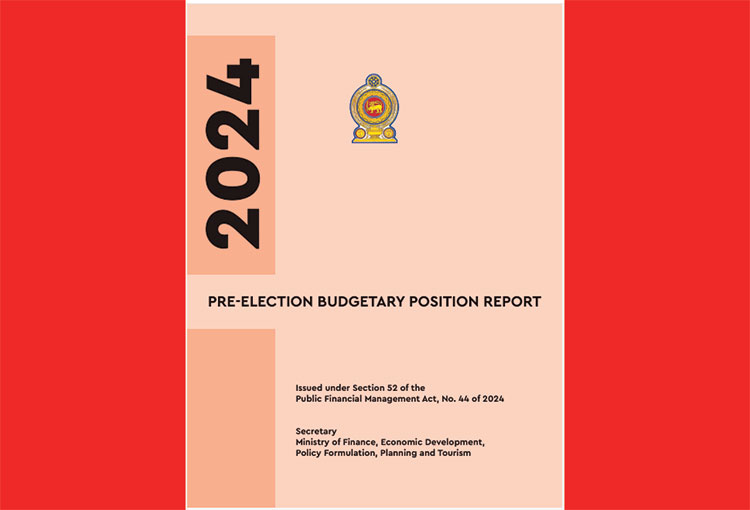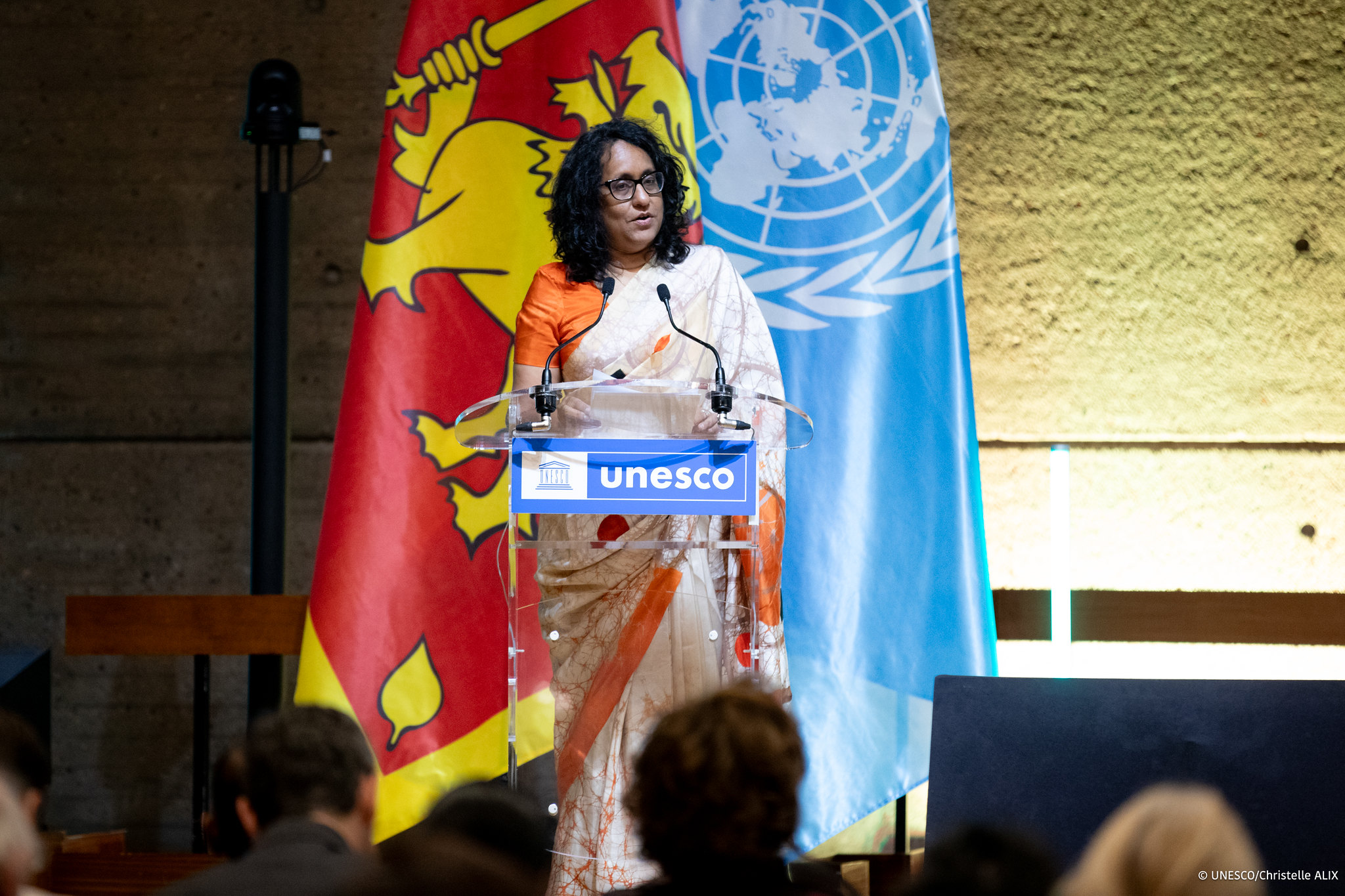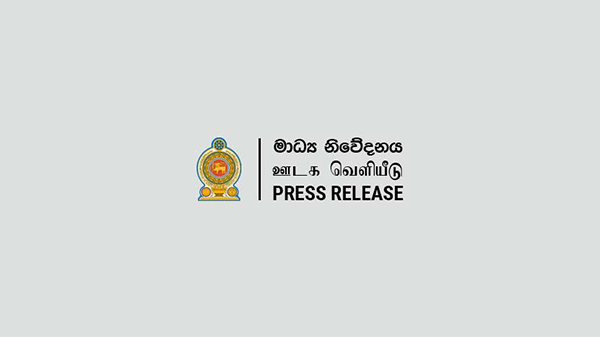News
SL govt. revenue rises by 40.5% in first eight months of 2024

Due to increased tax collection and import relaxation
Revenue from taxes on external trade increased by 29.0 percent to Rs. 302.5 billion in the first eight months of 2024 from the same period in 2023, emanating from increase in imports due to the gradual relaxation of import restrictions, Pre-Election Budgetary Position Report 2024 issued by the Ministry of Finance earlier this week said.
The increases in revenue collection from Special Commodity Levies (SCL) by 110.1 percent to Rs. 67.2 billion with the increase in SCL rates on essential commodities such as sugar and potatoes and the increase in revenue receipts from Customs Import Duty (CID) and CESS. Revenue collection from the Ports and Airports Development Levy (PAL) slightly increased by 3.4 percent despite the phasing out of PAL on selected items.
Revenue collected from income taxes increased by 16.3 percent to Rs. 624.7 billion in the first eight months of 2024, achieving 57.8 percent of the annual estimate of Rs. 1,080.0 billion. The increase in revenue from income tax was mainly due to the increase in revenue collection from Advance Personal Income Tax (APIT) and Withholding Tax (WHT) in the first eight months of 2024 from the same period of 2023. Revenue from taxes on goods and services increased by 59.8 percent to Rs. 1,421.3 billion in the first eight months of 2024. This was mainly due to the increase in revenue collected from Value Added Tax (VAT) by 87.2 percent to Rs. 842.5 billion, surpassing the total VAT revenue realized in 2023 by Rs. 148.0 billion stemming from the increase in VAT rates, reduction in the registration threshold, and removal of the vast majority of exemptions. This increase was also driven by increased revenue from the Excise Duty on petroleum products, Excise Duty on liquor, and Social Security Contribution Levy (SSCL).
The revenue from non-tax increased by 31.7 percent to Rs. 209.3 billion in the first eight months of 2024 from Rs. 158.8 billion in the same period of 2023. This has mainly been driven by the increase in revenue from fines, fees and charges, and interest income.
The total government expenditure increased slightly by 5.4 percent to Rs. 3,476.9 billion in the first eight months of 2024. Recurrent expenditure, which accounted for around 87.5 percent of total expenditure in the first eight months of 2024, slightly increased by 3.4 percent to Rs. 3,041.6 billion from Rs. 2,941.7 billion in the same period of 2023. This was mainly driven by the increase of salaries and wages by 6.7 percent to Rs. 659.5 billion in the first eight months of 2024 from Rs. 618.1 billion in the same period of 2023 due to an increase in cost-of-living allowance and the increase of interest payments by 2.2 percent to Rs. 1,559.7 billion in the first eight months of 2024 from Rs. 1,525.7 billion in the same period of 2023 owing to the increase in interest payment on domestic debt, foreign debt and domestic loans. Expenditure on subsidies and transfers increased slightly by 1.5 percent to Rs. 623.8 billion in the first eight months of 2023. Meanwhile, the capital and net lending significantly increased by 22.4 percent to Rs. 435.3 billion in the first eight months of 2024 from Rs. 355.6 billion in the same period of 2023.
Government Revenue including grants increased by 40.5 percent or Rs. 739.3 billion in the first eight months of 2024 from Rs. 1,826.6 billion in the same period of 2023 owing to the increase in tax revenue by 41.4 percent to Rs. 2,348.5 billion in the first eight months of 2024 from Rs. 1,661.2 billion in the same period of 2023. Revenue from taxes on goods and services, which account for 60.5 percent of total tax revenue, increased by 59.8 percent, or Rs. 531.9 billion, to Rs. 1,421.3 billion in the first eight months of 2024 from Rs. 889.5 billion in the same period of 2023. This increase was largely driven by the notable increase in revenue from Value Added Tax (VAT), which increased by 87.2 percent to Rs. 842.5 billion in the first eight months of 2024 from Rs. 450.0 billion in the same period of 2023. Thus, revenue collected from VAT in the first eight months of 2024 outperformed and surpassed Rs. 694.5 billion of revenue collected from VAT for the entire year of 2023. However, positive momentum in revenue generation must be sustained and enhanced over the medium term with a focus on tax compliance, eliminating tax leakages, digitalization, and minimizing corruption vulnerabilities through strengthened tax administration.
Expenditure on salaries and wages for public servants in the first eight months of 2024 including the salaries of employees attached to security forces, police, and Provincial Councils increased by 6.7 percent to Rs. 659.5 billion in 2024 from Rs. 618.1 billion in the same period of 2023. The increase in salaries was mainly attributable to the rise in the cost-of-living allowance by Rs. 5,000 per month effective from January 2024, and the increase of the same allowance by another Rs. 5,000 per month effective from April 2024, as per Public Administration Circular No. 03/2024 and Management Services Circular No. 01/2024. Total pension payments increased by 9.7 percent to Rs. 254.0 billion in the first eight months of 2024 from Rs. 231.6 billion in the same period of 2023.
Interest Payments
Expenditure on interest payments on foreign and domestic debt amounted to Rs. 1,559.7 billion in the first eight months of 2024, which marks an increase of 2.2 percent compared to Rs. 1,525.7 billion recorded in the same period of 2023. Interest payments for foreign debt increased by 34.9 percent to Rs. 100.0 billion in the first eight months of 2024 from Rs. 74.1 billion recorded in the same period of 2023 partly due to the commencing of repayment of some bilateral loans. Moreover, the interest payments on domestic loans slightly increased by 0.6 percent to Rs. 1,459.7 billion in the first eight months of 2024 from Rs. 1,451.6 billion in the same period of 2023.
Welfare and Subsidy Payments
The estimates of Rs. 1,055.7 billion for 2024 have been earmarked for the welfare programmes of social welfare, social security, education, health and nutrition and development assistance which is 15.4 percent of the government’s primary expenditure and 3.5 percent of the GDP. The estimate of Rs. 1,055.7 billion for 2024 represents a 15.3 percent increase compared to the actual expenditure of 2023 amounting to Rs. 915.4 billion. In the first eight months of 2024, the government’s welfare expenditure amounted to Rs. 562.4 billion including Rs. 112.7 billion for the “Aswesuma” programme, Rs. 9.5 billion for school nutrition food programme, Rs. 4.1 billion for the “Poshana Malla” programme, Rs. 4.4 billion for school textbooks and uniforms and Rs. 24.2 billion for fertilizer subsidy. Total welfare expenditure in the first eight months of 2024 increased by 3.3 percent to Rs. 562.4 billion from Rs. 544.3 billion in the same period of 2023. The increase was mainly driven by the increase of 83.9 percent of expenditure on health and nutrition, and the increase in development assistance by growth of 12.4 percent.
Latest News
PM underscores the outstanding universal value of Anuradhapura’s Living Heritage at International Expert Conference in Paris

Prime Minister Dr. Harini Amarasuriya who is on an official visit to France from 31 March to 2 April 2025, participated in the high-level segment of the International Expert Conference on “An Integrated and Sustainable Approach to Safeguarding the World Heritage Property of the Sacred City of Anuradhapura in Sri Lanka and Associated Living Heritage”, held at UNESCO Headquarters in Paris on Tuesday 1 April 2025.
The International Conference was organized by UNESCO in partnership with the Government of Sri Lanka to showcase the universal significance of the Sacred City of Anuradhapura and its associated living heritage, and to garner international cooperation for its conservation and sustainable development.
Inaugurating the Conference, Director-General of UNESCO Audrey Azoulay warmly welcomed Prime Minister Amarasuriya to UNESCO, while recalling her own memorable visit to Sri Lanka in July 2024 where she had the valued opportunity to witness firsthand the “exceptional heritage” of the Sacred City of Anuradhapura, which she described as “a spiritual hub, a royal capital of over a 1,000 years, and the birthplace of Theravada Buddhism.” Referring to the inscription of Anuradhapura in the world heritage list in 1982, she underscored the importance of global solidarity and international cooperation in safeguarding this extraordinary world heritage for posterity, and the intent of the Conference to explore further means of its conservation and sustainable development through international cooperation. In concluding her address, the Director-General recalled the words of renowned Sri Lankan archaeologist and former President of ICOMOS International Dr. Roland Silva, that Anuradhapura continues to be “a modern wonder of the world.’
Addressing the high-level segment, Dr. Harini Amarasuriya outlined Sri Lanka’s national vision to preserve the global heritage of the Sacred City of Anuradhapura for education, pilgrimage and heritage tourism, while ensuring the maintenance of a careful balance between conservation, sustainable development, and the needs of local communities. The Prime Minster also extended her deep appreciation to Director-General Azoulay for her vision and leadership which was instrumental in convening this International Conference dedicated to Anuradhapura.
Striking a personal note, the Prime Minister reminisced about her childhood and youthful memories of this heritage city, where she felt “the magic of Anuradhapura, the sense of awe at the creativity and skills of our ancestors.” She described Anuradhapura as “a unique mix of the ’sacred’ (activities belonging to the spiritual realm) and the ’profane’ (relating to the everyday and the material realm),” while also highlighting the advanced architectural and hydraulic expertise of this ancient civilization, whose origins can be traced back to 900 BCE.
Referring to UNESCO’s institutional mandate, the Prime Minister commended the organization—led by the Director-General, the secretariat, and its member states—for its invaluable contributions to advancing global discussions on education reform, mainstreaming cultural recognition, and harnessing knowledge and innovation for global peace and sustainable development amid complex geopolitical challenges.
Delivering the keynote address, the Minister of Buddhasasana, Religious and Cultural Affairs Dr. Hiniduma Sunil Senevi presented the integrated management plan of the Government of Sri Lanka towards the sustainable and integrated management of the Sacred City of Anuradhapura. He reiterated the Sri Lanka Government’s commitment to preserving the Outstanding Universal Value of the heritage site through inclusive, sustainable development. He further urged the international community to join hands with Sri Lanka in safeguarding this shared heritage for future generations, and to ensuring that its benefits reach local communities.
The Conference brought together internationally recognized experts, senior officials of government, development partners, heritage professionals and the diplomatic corps in exploring innovative and sustainable approaches to integrated site management. The key themes discussed comprised the integration of tangible and intangible heritage, capacity building, strengthened community participation, the application of digital tools in conservation, sustainable tourism aligned with World Heritage guidelines, and the critical importance of international partnerships and resource mobilization for long-term preservation of this heritage site.
The Prime Minister had a meeting with Director-General Azoulay on the sidelines of the Expert Conference where thematic areas of cooperation were discussed. The Prime Minister highlighted Sri Lanka’s interest in enhancing UNESCO’s presence in the country through suitable programmes, and apprised the Director-General on progress in Sri Lanka’s Category II South Asia Centre for Teacher Development (SACTD), Sri Lanka’s engagement in the programme of work of UNESCO, Sri Lanka’s educational reforms and areas of synergy with UNESCO, as well as the country’s commitment to the annual celebration of Vesak in UNESCO, among other matters. The Director-General reiterated UNESCO’s continued commitment to supporting Sri Lanka’s multifaceted collaboration with the international body.
At a reception hosted by the Ambassador and Permanent Delegation of Sri Lanka to UNESCO, the Prime Minister underscored the importance of Sri Lanka’s 75-year partnership with UNESCO, and reaffirmed the country’s commitment to further strengthening this collaboration in key areas of cooperation. She did so in her capacity as the Minister of Education, Chairperson of the Sri Lanka National Commission for UNESCO, and Chairperson of the Central Cultural Fund.
The Prime Minister also formally handed over to the Director-General, Sri Lanka’s Instrument of Accession to the 2005 UNESCO Convention on the Protection and Promotion of the Diversity of Cultural Expressions, demonstrating the country’s commitment to promoting cultural diversity, artistic freedom, and international collaboration. Ambassadors and Permanent Delegates accredited to UNESCO, senior representation of the UNESCO Secretariat including Director and team of the World Heritage Centre, the President of the France – Sri Lanka Friendship Group in the French National Assembly, expert participants of the Conference, academics, scholars and senior officials of the French Ministry for Europe and Foreign Affairs attended the reception and conveyed their warm greetings and felicitations to the Prime Minister.
The delegation of the Prime Minister comprised the Minister of Buddhasasana Religious and Cultural Affairs Dr. Hiniduma Sunil Senevi; the Director General, Central Cultural Fund Dr. Nilan Cooray and the Director General, Department of Archaeology Prof. Thusitha Mendis. The Prime Minster was assisted by the Ambassador and Permanent Delegate of Sri Lanka to UNESCO Manisha Gunasekera and senior staff of the Embassy and the Permanent Delegation of Sri Lanka to UNESCO.
[Prime Minister’s Media Division]
Latest News
Deshabandu Tennakoon further remanded until April 10

The Matara Magistrate’s Court has ordered that former Inspector General of Police (IGP) Deshabandu Tennakoon be further remanded until April 10.
The former IGP has been held in remand custody after he surrendered to the Matara Magistrates court on 19th March 2025.
Latest News
President appoints committee to submit recommendations to the Government on the new US tariff system

President Anura Kumara Disanayake appointed a committee to conduct an in-depth study on potential issues that may arise due to the new reciprocal tariff system introduced by US President Donald Trump and to submit recommendations to the government.
Accordingly, the committee includes the Secretary to the Ministry of Finance, the Governor of the Central Bank, the Chairman of the Board of Investment of Sri Lanka, the Chairman of the Sri Lanka Export Development Board and the Director General of Economic Affairs at the Ministry of Foreign Affairs.
Additionally, Senior Economic Advisor to the President Duminda Hulugamuwa, Chief Economic Policy Advisor to the Ceylon Chamber of Commerce Shiran Fernando, as well as Ashroff Omar, Sherad Amalean and Saif Jafferjee have also been appointed to the committee.
-

 Sports5 days ago
Sports5 days agoSri Lanka’s eternal search for the elusive all-rounder
-

 News4 days ago
News4 days agoBid to include genocide allegation against Sri Lanka in Canada’s school curriculum thwarted
-

 News6 days ago
News6 days agoGnanasara Thera urged to reveal masterminds behind Easter Sunday terror attacks
-

 Sports21 hours ago
Sports21 hours agoTo play or not to play is Richmond’s decision
-

 Business7 days ago
Business7 days agoAIA Higher Education Scholarships Programme celebrating 30-year journey
-

 News5 days ago
News5 days agoComBank crowned Global Finance Best SME Bank in Sri Lanka for 3rd successive year
-

 Features5 days ago
Features5 days agoSanctions by The Unpunished
-

 Features5 days ago
Features5 days agoMore parliamentary giants I was privileged to know











